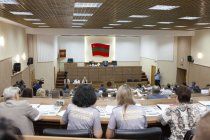 Русский
Русский English
English-







Debt transfer along with property
A group of deputies of the parliamentary committee on state regional policy acted as the authors of the addendum to the Housing Code. New legal norm is intended to help solve the long-standing problem of collecting consumer debts to housing and communal services organizations.
Currently, the number of defaulters exceeds 50 thousand people in the republic. The amount of debt to power supply organizations and organizations that manage apartment buildings is 150 million rubles. These funds are not transferred to the accounts of specialized enterprises, which must maintain their material base in proper condition in order to uninterruptedly carry out their prescribed functions in providing consumers with water, heat, electricity, and gas. At the same time, the level of wear of engineering communications of electricity, heat, gas, water supply and wastewater ranges from 70-90%.
The law-in-draft was presented during the plenary session by the head of the relevant parliamentary committee on state regional policy Anton Onufienko. He said: the document stipulates that when a residential property is transferred to another entity, the transfer of debt obligations for payments for residential premises and utilities to the new owner should also become an indispensable condition for the contract to be concluded. The lender represented by the resource-supplying organization must also give its consent to this. In this case (if the previous owner has debts), the contract should be trilateral. Exhaustive information about the debts of the former owners can be received by those who wish in the settlement and information center, as well as in housing and utilities organizations.
In addition, in the ensuing debate, deputies drew attention to the need to intensify the work of the legal services of housing and communal enterprises to recover debts from their subscribers to service.
Deputies of the same committee initiated the adoption of amendments to the law “On local public hearings in the administrative-territorial units of the PMR”. They propose to transform the principle of compulsory holding of local public hearings on the construction and reconstruction of urban planning facilities into an opportunity (right).
In support of their position, the authors of the legislative initiative noted that now the same norms of the Housing Code provide that the construction of new facilities within the boundaries of populated areas is possible only if 2/3 of apartment owners in the buildings adjacent to the building favor it.
Both legislations are adopted by the Supreme Council in the first reading. They are finalized in the light of suggestions and comments made during the consideration of legislations.




